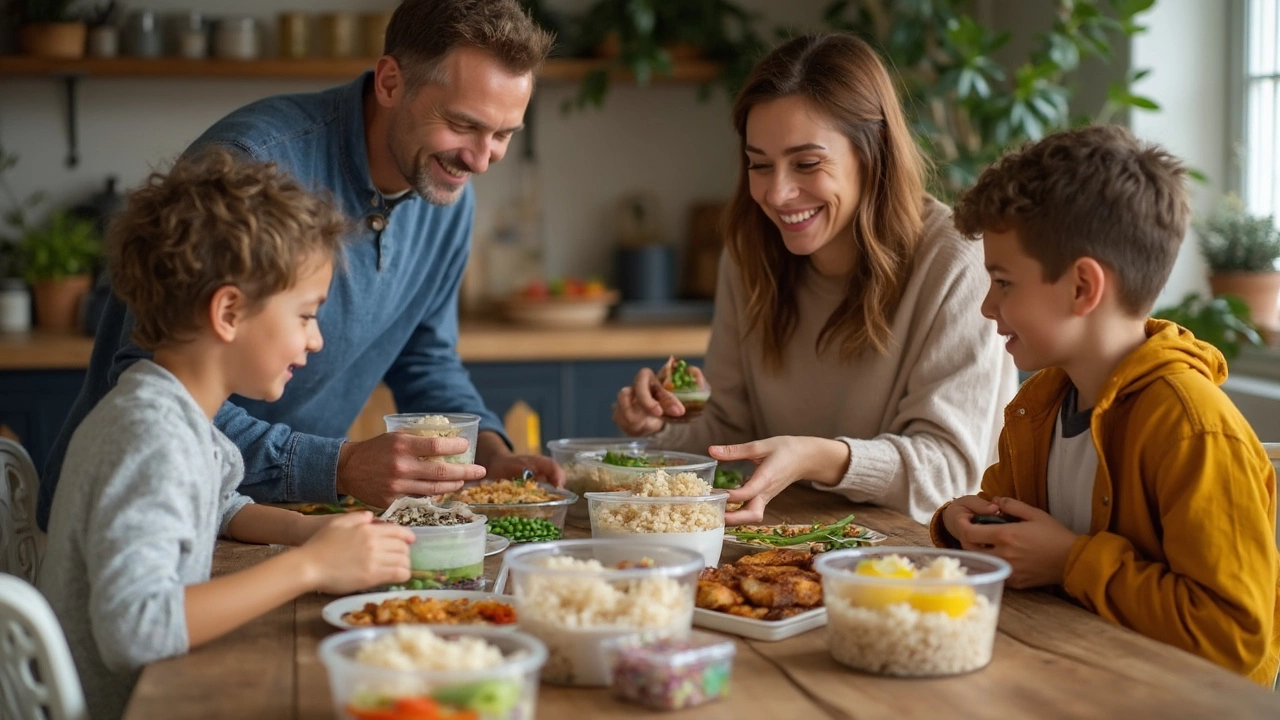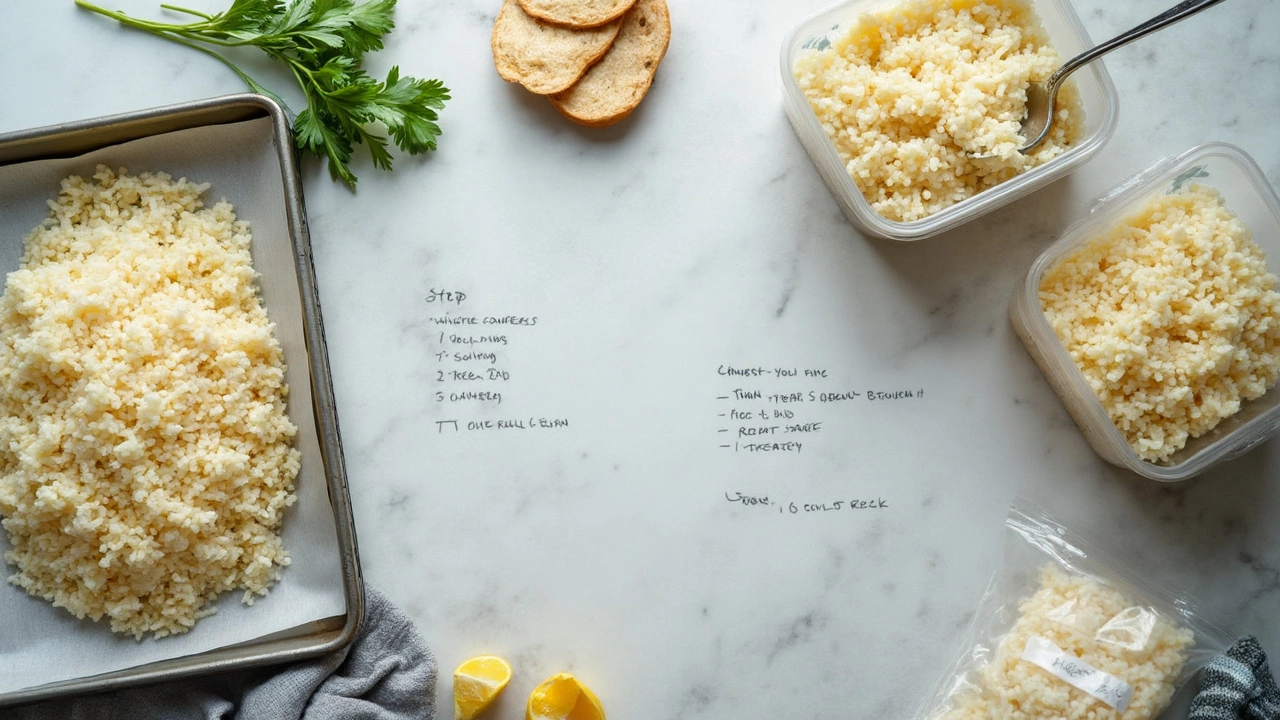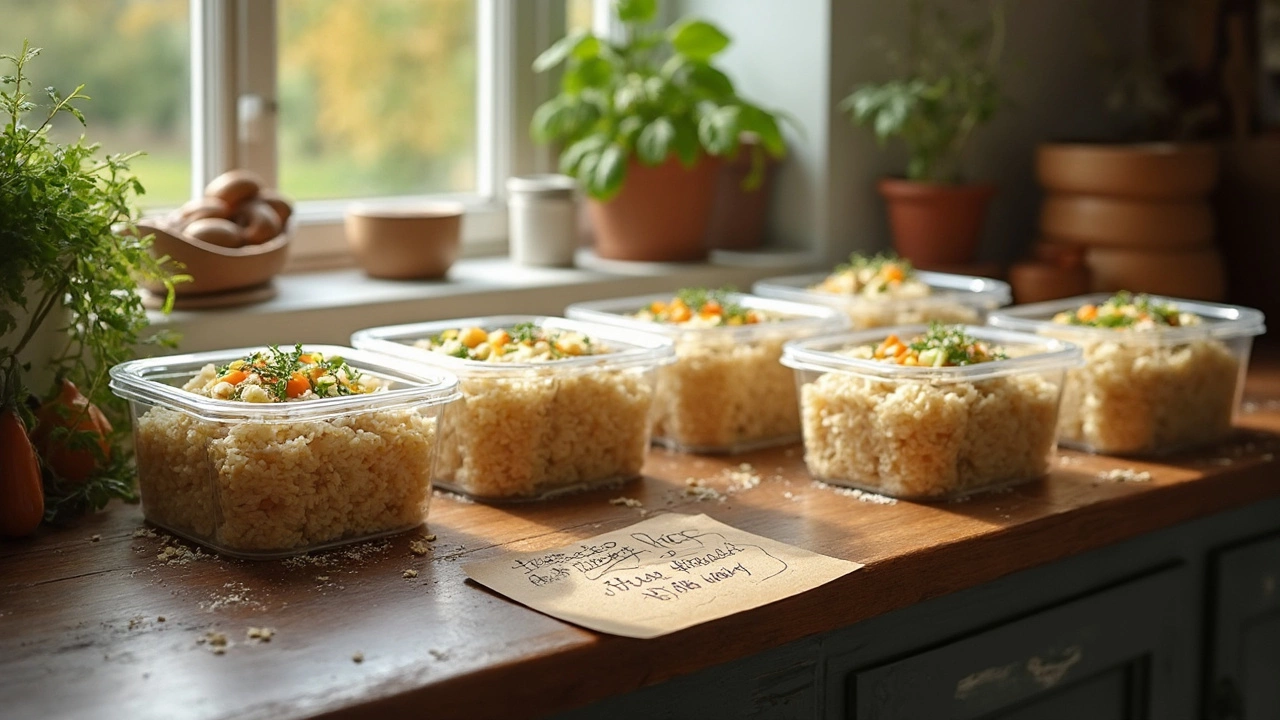If you’ve ever thought, “Can I actually meal prep rice and just grab it when I need it?”—yes, you absolutely can. A lot of folks meal prep rice because it’s cheap, filling, and goes well with pretty much anything. But there’s some stuff you need to know first, especially about keeping rice fresh and safe to eat.
The real trick is handling rice the right way once it’s cooked. Rice gets a bad rap for food poisoning—seriously, it’s not just your grandma being dramatic. Cooked rice should cool down fast, get into the fridge quick, and never linger at room temp. Get this part right, and you can say goodbye to soggy, dry, or even risky rice in your fridge.
Here’s a little secret: if you batch cook rice, your weekly meals get a million times easier. You’ll save time, skip mess, and have the base for stir-fries, bowls, or burritos ready to go. But don’t just throw hot rice into a container and hope for the best. Let’s get into the practical secrets for nailing rice meal prep, every time.
- Why Meal Prep Rice?
- Cooking Rice for Meal Prep
- Storing Rice Safely
- Reheating Without Ruining It
- Fun Ways to Keep Rice Interesting
Why Meal Prep Rice?
Let’s be real—meal prep rice isn’t just hype. If you’re trying to streamline your week, rice makes life a lot easier. It’s quick to cook in big batches, cheap, and goes with almost any protein or veggie combo. Ever notice how every meal prep photo on Instagram has a scoop of rice in it? That’s because it plays nice with different cuisines—think stir fries, burrito bowls, curries, and sushi.
Another big reason: it stretches your grocery budget. A single bag of rice can cover a week of lunches for just a couple of bucks—way less than pre-made convenience foods. Not to mention, you control what goes in, from the type of grain to the seasoning. No mystery ingredients, no excess oil, and no sodium overload unless you want it.
- Rice storage makes meal planning flexible. You can portion it into different containers, mix it up with other ingredients, and even freeze some for later.
- It’s a great backup when dinner plans change. Tired day? Defrost a container, toss in a fried egg or leftover meat, and you’re set.
If you eat for specific goals—maybe you’re upping your carbs for training, or need a gluten-free base for your meals—rice is a solid, reliable option. There’s a reason it’s a staple in so many cultures and diets: it can be whatever you need it to be, without fuss.
| Type of Rice | Fridge Life (days) | Calories (per cup cooked) |
|---|---|---|
| White | 4–6 | 205 |
| Brown | 4–6 | 215 |
| Jasmine/Basmati | 4–6 | 205 |
So, if you’re into saving time, money, and stress, meal prep rice just makes sense. You’ll always have a base ready to shape into something that tastes good—and keeps you full.
Cooking Rice for Meal Prep
Getting meal prep rice right from the start really matters. A lot of rice disasters come from rushing through cooking or ignoring measurements. The best way to avoid clumpy, mushy, or crunchy rice is to stick to a solid method. Try a 1:2 ratio—1 cup of dry rice to 2 cups of water—for most white rice. Brown rice likes a little extra water and takes longer to cook. If you use a rice cooker, even better—it's almost foolproof.
Wash your rice first. It sounds basic, but rinsing rice under cool water until it runs clear gets rid of surface starch. That means less sticky clumps when you reheat it later. If you're really into meal prepping, you might want to cook a double batch and freeze half. It reheats surprisingly well if you spread it out to cool first (and stick it in freezer-safe bags or containers).
Here’s what you want to remember when batch cooking rice:
- Always rinse until the water is almost clear—that extra step keeps rice grains separate.
- Add a teaspoon of oil or a pinch of salt before cooking for better flavor and texture.
- Don’t peek during cooking—letting steam escape messes up the water absorption.
- After cooking, fluff the rice gently with a fork to prevent it from clumping in the fridge later.
According to the USDA, “Cooked rice can be safely stored at 40°F or below in the refrigerator for 4 to 6 days, but cooling it quickly is crucial to reduce bacteria growth.”
"Rice should be chilled within one hour of cooking to prevent Bacillus cereus from multiplying. Spread it out in a thin layer for fastest cooling." – USDA Food Safety and Inspection Service
If you want a quick look at how different types of rice hold up for meal prep rice, check out this comparison:
| Rice Type | Cook Time | Texture After Reheating |
|---|---|---|
| White Jasmine | 15-18 min | Fluffy, holds up well |
| Brown Rice | 40-45 min | Chewy, stays separate |
| Basmati | 12-15 min | Light, retains aroma |
If you nail these basics, you’ll never dread meal prepping rice again. Plus, you'll actually want to eat it all week.

Storing Rice Safely
Here’s the deal: storing meal prep rice is all about speed and temperature. Cooked rice can grow bacteria fast if you leave it sitting out for more than an hour or two. That means the sooner you get your hot rice cooled down and into the fridge, the better.
The safest move is to spread the rice out on a big baking sheet. This lets it cool quicker than keeping it in a big steamy pot. Once it’s no longer hot to the touch (usually 20-30 minutes), divide it into meal-sized portions and store.
- Use airtight containers to keep moisture out and flavor in. Glass or BPA-free plastic both work.
- Label containers with the date, so you don’t lose track.
- Stick your containers in the coldest part of your fridge, usually the back, and always below 40°F (4°C).
If you follow these steps, cooked rice is good for up to 4 days in the fridge. Pushing it beyond that? Not worth the risk. Food poisoning from rice is no joke—research shows most cases start from rice left out too long at room temperature.
Freezing is a lifesaver if you want to keep rice longer. Just pop cooled, portioned rice into freezer bags or freezer-safe containers, squeeze out as much air as you can, and freeze flat if possible. Frozen rice lasts about a month and reheats without losing much texture.
| Storage Method | Max Safe Time |
|---|---|
| Refrigerator (below 40°F) | 4 days |
| Freezer (0°F) | 1 month |
There’s no shame in tossing rice if it smells off, feels slimy, or looks weird. Trust your senses—safe rice storage is way better than getting sick.
Reheating Without Ruining It
No one likes rubbery, dried-out rice. Reheating rice the wrong way turns it from fluffy to sad in seconds. If you want meal prep rice that keeps its taste and texture, there are some easy tricks you gotta follow.
The microwave is quick, but don’t just nuke your rice straight out of the fridge. Splash a little water over the rice, then cover it with a microwave-safe lid or even just a damp paper towel. This lets steam do its thing, making the rice soft again. Start with a minute on high, mix, and then keep heating in 30-second bursts until it’s hot all the way through. The USDA says leftovers, including rice, need to be heated to at least 165°F (74°C) to be safe to eat.
“Adding a splash of water and covering rice before reheating locks in moisture and brings back that just-cooked texture,” recommends The Kitchn’s food editor, Grace Elkus.
If you like to cook on the stove, toss your rice in a skillet with a bit of oil or butter. This actually brings out a toasty flavor (yes, crispy bottom rice is definitely a thing). Stir often so it doesn’t stick. Add a little broth for flavor instead of water if you want to level it up. Just keep it moving until it’s hot—don’t walk away!
Here’s a super quick reference for reheating methods and what each one delivers:
| Method | Best For | Tips |
|---|---|---|
| Microwave | Speed | Moisten & cover; stir halfway through |
| Stovetop | Extra flavor, crispy rice | Add oil/butter; stir often |
| Steamer | Fragrant, fluffy rice | Keep covered, check water level |
One big rule for rice storage: never reheat it more than once. Take out what you’ll eat, heat that portion, and leave the rest in the fridge. Repeated reheating is how rice goes weird…and unsafe. Stick to these basics and your meal prep rice will come out perfect every time.

Fun Ways to Keep Rice Interesting
Rice doesn’t have to be that boring white pile sitting next to your chicken. With a couple of simple tricks, leftover meal prep rice can taste completely different every single day. No one wants to eat the exact same thing four days straight. Here’s how to keep things fun and flavorful:
- Switch up seasonings: Mix in sriracha and soy sauce for an easy Asian vibe, or try taco seasoning for a Mexican feel. Even simple combos like garlic powder and Italian herbs liven things up big time.
- Mix in veggies: Frozen peas, corn, or diced bell peppers go straight into the hot rice. They thaw quick and add crunch, color, and vitamins.
- Stir in protein: Toss in leftovers—shredded rotisserie chicken, canned beans, or scrambled eggs. Suddenly your rice meal prep is more like a rice bowl that actually fills you up.
- Add sauces or dressings: Pesto, teriyaki, chimichurri, or even a drizzle of vinaigrette changes the whole game. A tiny bit goes a long way with cold or reheated rice.
- Transform it completely: Use day-old rice for fried rice or rice pancakes. Day-old rice actually makes the best fried rice, since it’s drier and soaks up sauces better.
If you’re a numbers person, a recent survey found that 65% of people trying meal prep rice stopped getting bored once they started adding just one new mix-in each week. So, one tiny tweak keeps things fresh and exciting.
| Mix-In | Flavor Profile | When to Add |
|---|---|---|
| Soy sauce and sesame oil | Asian | After reheating |
| Lime juice and cilantro | Fresh/Mexican | Right before serving |
| Feta and olives | Mediterranean | Mix in after reheating |
Play around! The point is, meal prep rice is just a blank canvas. Try something new each week—your taste buds (and your wallet) will thank you.





